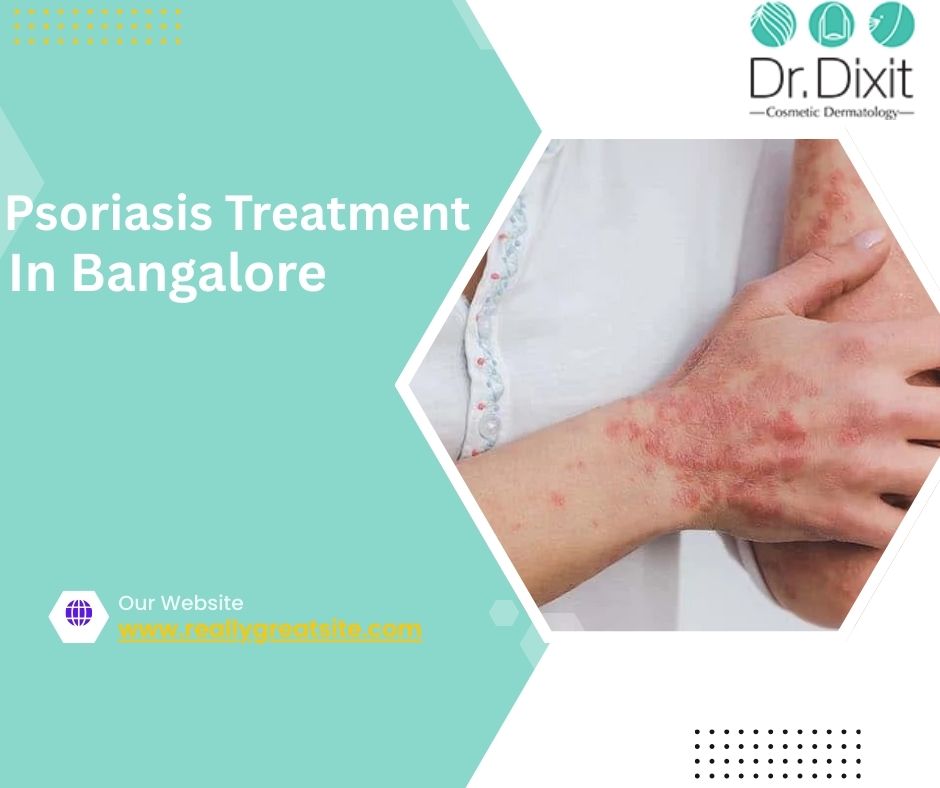Our skin and nails can show sudden changes in appearance and feel because of some dermatological conditions. Understanding what the changes indicate and how serious they can be is very important so that appropriate Psoriasis Treatment In Bangalore can be timely undertaken. Dermatologist Dr. Rasya Dixit can help with this.
If ended up on this page when searching for symptoms of psoriasis, get your confusion cleared about your concern by consulting the best dermatologist. But before that continue reading this post that details psoriasis to get help in identifying your skin or nail condition. If your suspect is right, you can also learn about psoriasis treatment here.
What is Psoriasis?
Psoriasis is a long-term, immune-mediated disease, a dermatological condition where the skin cells rapidly multiply. It typically leads to the appearance of red/discolored, itchy, and scaly skin patches. An overactive immune system or other inflammatory condition may develop psoriasis. The condition may be triggered by certain medications/changes in drug intake, stress, skin injury/trauma, infection, or alcohol/tobacco use.
Signs of Psoriasis
Psoriasis can manifest in different ways. Here are its potential symptoms:
- Plaques- thick, raised patches of skin being red, brown, or purple colored (as per complexion); often red patches with silvery-white scales
- Dry, cracked skin that is easy to bleed or itch
- Itchy, sore, or burning/stinging patches of skin
- Pitted, thickened, or ridged fingernails or toenails
- Pustules or blisters
- Loose fingernails or toenails that separate from the nail bed (in severe cases)
- Aching, swollen, or stiff joint (in case of psoriatic arthritis)
- Itchy, flaky scalp skin causing hair loss (in case of scalp psoriasis)
- Disturbed sleep (due to itch or discomfort).
Different Types of Psoriasis
An individual can be affected with multiple types of psoriasis at a time or throughout life. These types are differentiated based on the location and appearance of the symptoms.
The 5 main types of psoriasis are:
- Plaque psoriasis (most common)- The plaques are inflamed, itchy, scaly patches appearing as red with silvery-white build-up on Caucasian skin and thicker, darker (purple, grayish, or dark brown) on the dark complexioned individual. This type often accompanies nail psoriasis.
- Inverse psoriasis- Purplish, brown, or darker lesions appear in the skin folds of the body of a dark-complexioned individual. In the case of Caucasian skin, the lesions appear bright red and are smooth and shiny. Friction on deep folds of skin can trigger this psoriasis.
- Pustular psoriasis- In this type, sterile pustules (pus-filled pimples) possibly surrounded by reddened/discolored or inflamed skin appear. UV light exposure, streptococcal/staphylococcal infections, stress, or pregnancy can be its triggers amongst others.
- Guttate psoriasis- It shows up as small, round, finely scaly, red spots often on the arms, legs, and torso. Respiratory tract infections can be its triggers amongst others.
- Erythrodermic psoriasis- It may cause discolored skin and ill-defined plaques covering more than 75% of the surface area of the body with or without skin shedding or peeling. On dark complexion, the discoloration could be purple or brown. Serious symptoms include itch, swelling, exfoliation, fever and chills, fatigue, nail changes, hair loss, dehydration, and increased heart rate. Severe sunburn, infections, or illnesses, and alcohol use can be its triggers amongst others.
The Areas Affected by Psoriasis
Psoriasis signs can be noticed anywhere on the body. Commonly, they are seen on the:
- Face
- Feet
- Elbows
- Knees
- Hands
- Scalp
- Nails
- Skin folds (including pubic area)
How Do Dermatologists Identify Psoriasis?
To confirm the diagnosis of psoriasis and identify its type, dermatologist in Bangalore Dr. Rasya Dixit:
- Fully examine the skin/nail and note its appearance
- Consider the location of psoriasis
- Consider the associated symptoms like itch, pain, swelling, and others
- Review the medical records of the patient
- Perform a skin biopsy.
Psoriasis Treatments Provided by Dermatologists
The treatment plan may be created by a dermatologist as per the type and location of psoriasis. It focuses on improving the signs of psoriasis and minimizing the risk of psoriasis comorbidities like obesity, heart disease, psoriatic arthritis, depression, and diabetes.
The dermatologist recommended treatments and management options for psoriasis include:
- Topical steroids/non-steroids
- Systemic treatments including oral, biologic, and biosimilar treatments
- Phototherapy/ UV light therapy
- Complementary and integrative medicine including lifestyle modifications, natural products, and body/mind practices (for people living with psoriasis).
Got Psoriasis? Consult Dr. Rasya Dixit today!
Dr. Rasya Dixit is a leading dermatologist who practices at Dr. Dixit Cosmetic Dermatology Clinic and has expertise in handling psoriasis patients.

